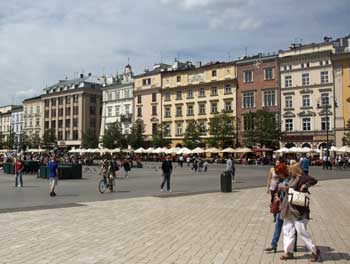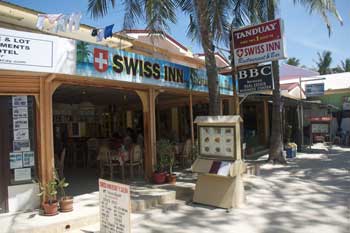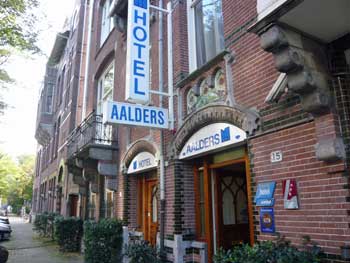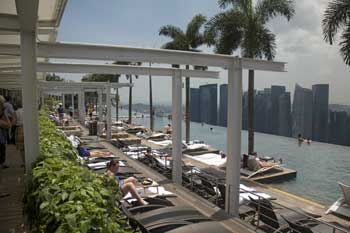Why booking hotels online is almost always cheapest, and you often get better rooms
I’ve spent 6 of the last 10 months living in hotels all over Europe and Asia doing research for this site, and I learned a few surprising things about getting the best deals. Since hotels pay commissions to online booking sites I assumed that booking directly or in person would get the best rates. In the past I think this was true, but now in the age of online reviews and cutthroat online competition, I discovered that booking online virtually always gets the best rate, even on the day of the stay.
Perhaps even more surprising I noticed that when I booked online through certain sites in certain areas I would usually get one of the best rooms in the hotel while walk-in guests were paying a bit more for an inferior room. When I studied the situation and talked to some hotel owners it began to make sense, so I decided to explain how it seems to work these days below.
How online hotel bookings work
The business model with online hotel bookings won’t be too surprising. If you use an Online Travel Agency (OTA) such as Expedia, Priceline, booking.com, hotels.com, or Agoda, the agency keeps anywhere from 10% to 25% of the booking price as their commission. So if you book a hotel with a final price of US$100 per night, the OTA will take the payment and then send anywhere from US$75 to US$90 to the hotel after you’ve checked out.
When you book through an official website for a hotel or hotel chain, they keep most or all of the money (minus a small fee if the hotel uses an outside processing system). So if you book a hotel online or just walk in with cash or a credit card, the hotel stands to make more money if you pay the same room rate.
So it’s surprising that hotels offer their lowest rates online, but they do

Almost any business will offer a discount to a customer who buys (or books) early because they prefer guaranteed income and it helps them control their inventory. Even if some days a hotel could make more by filling up with walk-ins, most days they’d have empty rooms so they want to fill them as early as possible. The OTA commissions are built into their price structure (as with their competitors’) so they are very happy to be fully booked at discount rates in advance.
Walk-ups have almost no bargaining power
One key reason that hotels rarely offer their best prices to walk-ins is that they know these guests are “inelastic” (most will stay regardless of price). Imagine 5 similar hotels along one street. Especially if you are hauling luggage, they know that only the cheapest imaginable guests will check the prices of all of them and bargain for the best deal.
In fact, there’s a decent chance that they’ll all quote you the same rate because if they get into a bargaining war with eachother they are all the losers. If the hotel is well run they’ll realize that they have low incentives to undercut the other hotels or their own online rates, and most people will just agree to a price if it’s within their range.
On hotel-booking sites, the consumer is king

Now that the majority of hotel reservations are booked online, the properties have great incentives to undercut their competitors in price so they show up higher in the listings. In other words, the online hotel business has turned into sort of a reverse auction where each lowers its price far enough to fill up.
Online reviews are critical for better hotels
Many people seem to love to complain about TripAdvisor and the reviews on the individual hotel-booking sites, but I find that if you actually read them rather than just looking at the score, they are very reliable. The better hotels know this too as increasing numbers of guests will avoid places with no reviews or bad reviews.
So when a hotel has built a string of positive reviews and they are getting increased bookings as a result, they try to protect that good reputation by making sure guests leave happy. A property with a 4-star average with a recent string of 1- and 2-star reviews will lose a lot of business. The most interesting part is that it seems that if you book online you can often get preferred treatment even over those who pay more as a walk-up.
Likely online reviewers often get the best rooms

Think about it this way: A hotel that gets 50% of its bookings through Agoda and 50% by all other sources knows that the Agoda guests are probably 10 times more likely to write a review. As a result, when half their rooms face a park and the other half face a parking lot, the Agoda customers will generally get the park view. I’ve experienced this many times lately (especially in Asia with Agoda) where I check into a mostly-full hotel to discover that I’ve been assigned the best room in the place. These hotels dominated by one booking site also seem to give those guests more attention during the stay as well.
Advice for booking hotels online
Don’t book hotels more than 3 months in advance
Similar to airlines that offer the cheapest airfares 4 to 6 weeks before departure (or 11 weeks for international flights), hotels tend to keep prices higher until about 3 months out. The idea is the same in that they know that people booking very early aren’t too sensitive on price, so they wait to offer deals until they know they have too many rooms available.
For chain hotels always check the official site

Of course it’s also worth mentioning that chain hotels tend to be more expensive than similar independent hotels nearby, so you’ll still probably get a better deal using the booking sites. It’s really only when you are sure you want to stay at a chain that those special rates on the official sites make sense.
Book online for best deals and treatment, even on the same day
Again, considering all of the above you might have thought that you could get a better deal by walking into a hotel on the day, but you are still going to get lower rates by booking online even while standing on the sidewalk right out front. There are many smart phone apps that specialize in instant last minute bookings and they almost always offer the best deals if you’ve waited that long.

When I was using Priceline for all of my stays several years, I noticed that the tone of the staff at most of Marriott properties, specifically Sheraton & Westin changed (& not in a good way) once they realized I had booked that way. I got so many rooms by the elevator, I googled to see if it was deliberate. It was. The next time I checked in i asked if they could make sure I got a room by the elevator and it
would be really great if it could also be next to the ice machine or the laundry room. And if I could get all 3 that would be perfect. I was put in a corner room at the end of the hall which actually was perfect.
Rufus,
I’ve heard about this sort of thing and I’m sure it happens frequently, but I do stand by my point that many other hotels care more about reviews on those platforms and they can’t treat guests too poorly. Thanks for your insights. -Roger
An interesting article and some good guidance. I still can’t understand however why an hotel with empty rooms would take the chance of loosing custom of walk in, if charging more than pre booked price. Even if not pre booked many customers will have a guide price in mind from previous research. As you say. May be better an empty room rather than bad review.
Geoff,
There are always exceptions, but in my experience the people who are walking in are often doing so without having researched online. This article was written several years ago and it may no longer be true as often. At this point, I think at least 80% of people do online research when looking for hotels, and years ago that number was probably closer to 50%. -Roger